This article was co-authored by Chris M. Matsko, MD. Dr. Chris M. Matsko is a retired physician based in Pittsburgh, Pennsylvania. With over 25 years of medical research experience, Dr. Matsko was awarded the Pittsburgh Cornell University Leadership Award for Excellence. He holds a BS in Nutritional Science from Cornell University and an MD from the Temple University School of Medicine in 2007. Dr. Matsko earned a Research Writing Certification from the American Medical Writers Association (AMWA) in 2016 and a Medical Writing & Editing Certification from the University of Chicago in 2017.
wikiHow marks an article as reader-approved once it receives enough positive feedback. In this case, 85% of readers who voted found the article helpful, earning it our reader-approved status.
This article has been viewed 207,648 times.
A runny nose is a common occurrence in cold weather. It occurs because, as your nasal passages try to warm the air before it reaches your lungs, there is production of additional fluid.[1] Therefore, the way to prevent a runny nose in cold weather is to warm and moisten the air before it reaches your nose.
Steps
Preventing and Treating a Runny Nose From Cold Weather
-
1Wrap your nose and mouth with a wool scarf when outdoors. Breathing through the scarf will warm the space between your face and the scarf. You will also exhale moisture into the space which will moisten the air. By warming and moistening the space, your sinuses won't have to produce as much moisture and your nose will not run.
-
2Run a humidifier when indoors. The air may be warm enough, but if it's too dry it may still trigger a runny nose. You can use individual room humidifiers or have a whole-house humidifier installed.Advertisement
-
3Use a saline nasal spray to moisten your nasal passages. This runny nose remedy will keep your nasal passages moist and help prevent you from over-producing mucus.[2]
-
4Try a medicated nasal spray such as Dristan (or anything that has "pseudoephedrine" listed in the ingredients). It is not recommended to use this on a regular basis, but it okay to use now and then if you have important things to do in the colder weather and you don't want your runny nose to get the best of you. For instance, if you are a competitive skier, you may want to use a nasal spray before your race.[3]
- What it does is prevent fluid build-up for a little while, allowing you to complete your activity (such as the race) without worrying about your nose running.[4]
- However, it can sometimes cause more of a runny nose after the nasal spray wears off, so this is why it is not recommended to use on a daily basis.[5]
- If Dristan or another over-the-counter nasal spray is insufficient, see your doctor about the option for a stronger prescription corticosteroid nasal spray.[6]
-
5Take an over-the-counter decongestant pill. Something like Sudafed (or anything with "pseudoephedrine" in the ingredients list) should work well. You can speak to the pharmacist for advice if you would like help choosing one.[7]
- Taking this type of medication will notably decrease the amount of mucus production in your nose, alleviating symptoms of runny nose from the cold.
- However, once again it is important not to use this frequently, as it can worsen your runny nose when the medication wears off. Therefore, only use it if there is something important you want to do in the colder weather, and it is important to you not to have your nose run for that period of time.
Assessing the Cause of Your Runny Nose
-
1Be aware of possible diagnoses. When your nose runs, it may be due to sickness (which will likely be accompanied by other symptoms of a "cold," such as sore throat, cough, etc), being upset (when we cry, excess water from our tears drains through the nose), or cold weather (as our nasal passages are designed to heat the air before it reaches our lungs, and in order to do so your nose produces extra fluid in the cold weather).
- It may also be related to allergies, irritants in your environment (such as smoke), or a side effect of certain medications.[8]
-
2Understand why your nose runs when it's cold. When you breathe through your nose, your sinuses warm and moisten the air by swirling it around the mucous membranes that line the passages. This prevents you from irritating your lungs and throat with air that is cooler than your body temperature.[9]
-
3Know that runny noses from the cold are extremely common. Therefore, they are nothing to get overly worried about. They are so common, in fact, that sometimes it is called "skier's nose" due to the fact that nearly 100% of competitive snow sport athletes complain about runny nose!
- A runny nose from the cold is NOT related to an illness (and not related to the "common cold.")
- Although many people believe there is a link between cold weather and "catching a cold," this is thought to be due to spending more time indoors where people's germs are more readily passed to one another (and is not thought to be related so much to the cold outside).
Expert Q&A
Did you know you can get expert answers for this article?
Unlock expert answers by supporting wikiHow
-
QuestionWhat should I do if I have dry mouth, a sore throat, cough, and a cold?
 Chris M. Matsko, MDDr. Chris M. Matsko is a retired physician based in Pittsburgh, Pennsylvania. With over 25 years of medical research experience, Dr. Matsko was awarded the Pittsburgh Cornell University Leadership Award for Excellence. He holds a BS in Nutritional Science from Cornell University and an MD from the Temple University School of Medicine in 2007. Dr. Matsko earned a Research Writing Certification from the American Medical Writers Association (AMWA) in 2016 and a Medical Writing & Editing Certification from the University of Chicago in 2017.
Chris M. Matsko, MDDr. Chris M. Matsko is a retired physician based in Pittsburgh, Pennsylvania. With over 25 years of medical research experience, Dr. Matsko was awarded the Pittsburgh Cornell University Leadership Award for Excellence. He holds a BS in Nutritional Science from Cornell University and an MD from the Temple University School of Medicine in 2007. Dr. Matsko earned a Research Writing Certification from the American Medical Writers Association (AMWA) in 2016 and a Medical Writing & Editing Certification from the University of Chicago in 2017.
Family Medicine Physician
-
QuestionHow to cure a clogged nose?
 Chris M. Matsko, MDDr. Chris M. Matsko is a retired physician based in Pittsburgh, Pennsylvania. With over 25 years of medical research experience, Dr. Matsko was awarded the Pittsburgh Cornell University Leadership Award for Excellence. He holds a BS in Nutritional Science from Cornell University and an MD from the Temple University School of Medicine in 2007. Dr. Matsko earned a Research Writing Certification from the American Medical Writers Association (AMWA) in 2016 and a Medical Writing & Editing Certification from the University of Chicago in 2017.
Chris M. Matsko, MDDr. Chris M. Matsko is a retired physician based in Pittsburgh, Pennsylvania. With over 25 years of medical research experience, Dr. Matsko was awarded the Pittsburgh Cornell University Leadership Award for Excellence. He holds a BS in Nutritional Science from Cornell University and an MD from the Temple University School of Medicine in 2007. Dr. Matsko earned a Research Writing Certification from the American Medical Writers Association (AMWA) in 2016 and a Medical Writing & Editing Certification from the University of Chicago in 2017.
Family Medicine Physician
References
- ↑ http://www.npr.org/templates/story/story.php?storyId=99844567
- ↑ https://medlineplus.gov/ency/article/003049.htm
- ↑ http://www.drugs.com/mtm/dristan-sinus.html
- ↑ http://www.drugs.com/mtm/dristan-sinus.html
- ↑ http://www.drugs.com/mtm/dristan-sinus.html
- ↑ https://www.nlm.nih.gov/medlineplus/ency/patientinstructions/000404.htm
- ↑ https://medlineplus.gov/ency/article/003049.htm
- ↑ https://acaai.org/allergies/allergy-symptoms/runny-nose-stuffy-nose-sneezing
- ↑ http://www.npr.org/templates/story/story.php?storyId=99844567
About This Article
To prevent a runny nose in cold weather, wrap a woolen scarf around your face and nose to warm the air when you breathe, which will reduce the amount of moisture produced by your sinuses. You can also apply a saline nasal spray to keep your nose moist and cut down on mucus. When you're home, consider using a humidifier to increase the moisture in the air, since runny noses can be triggered by dry air. If you’re still having problems, try taking an over the counter decongestant pill, such as Sudafed. However, avoid using medication regularly, since your nose will run even more when it wears off. For tips from our Medical co-author on how to use medical nasal sprays, keep reading!
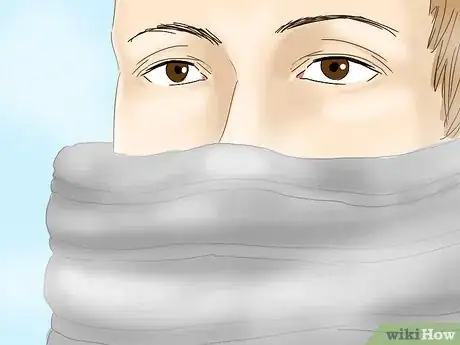
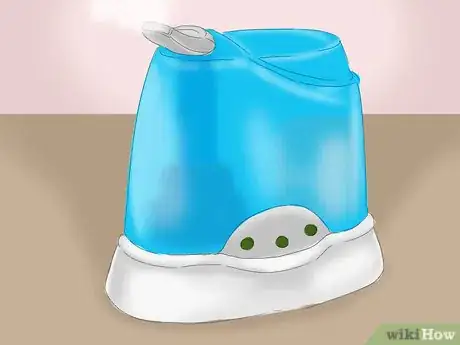
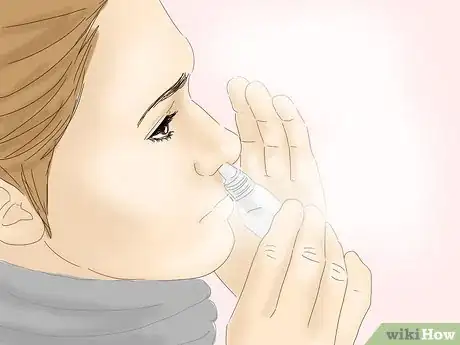
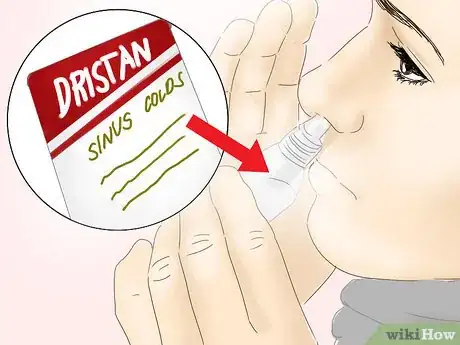

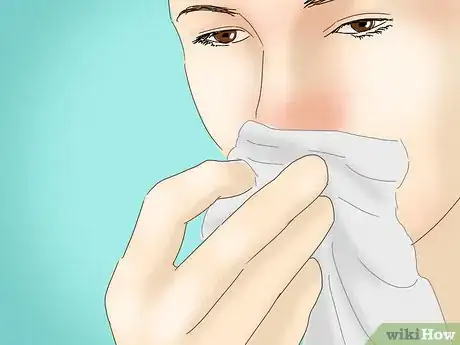

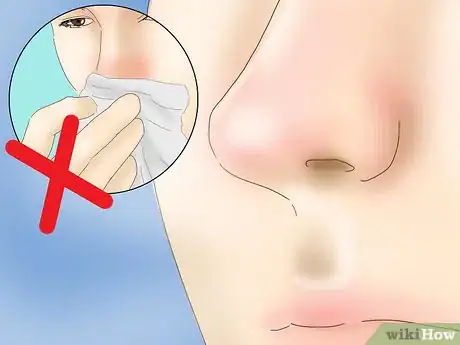



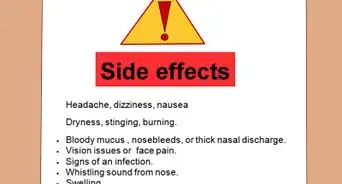
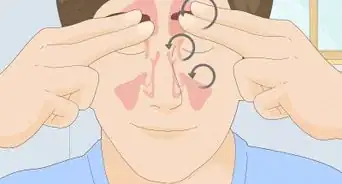






















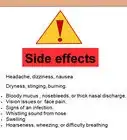



































Medical Disclaimer
The content of this article is not intended to be a substitute for professional medical advice, examination, diagnosis, or treatment. You should always contact your doctor or other qualified healthcare professional before starting, changing, or stopping any kind of health treatment.
Read More...